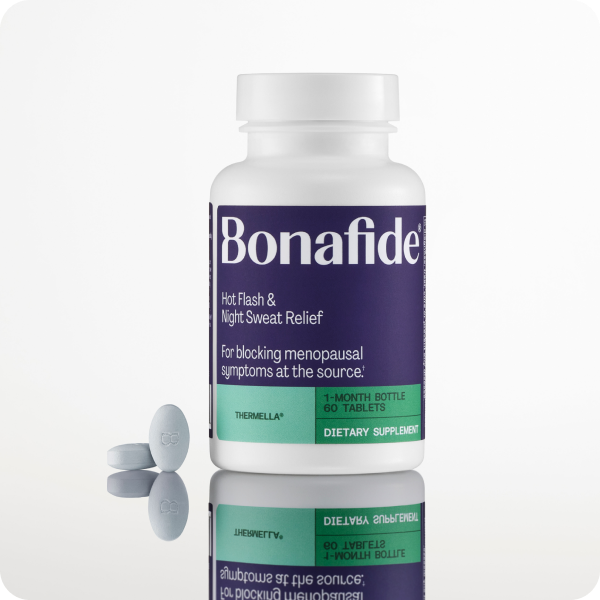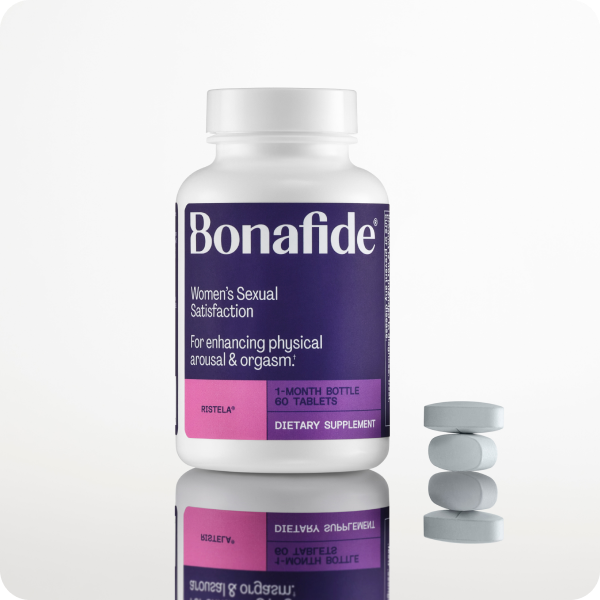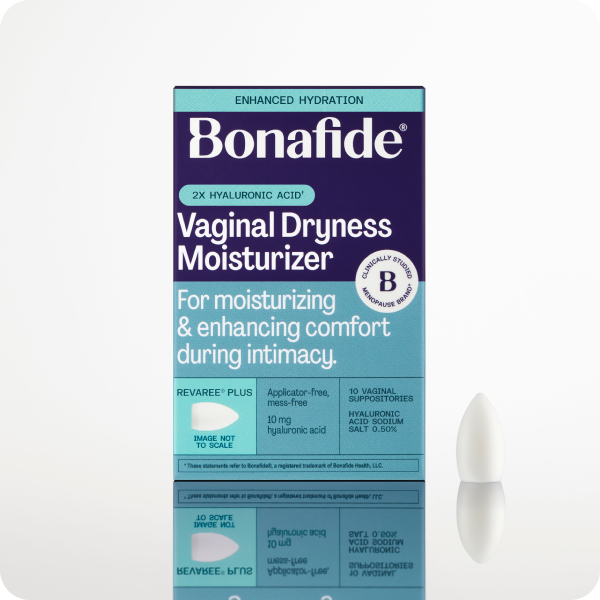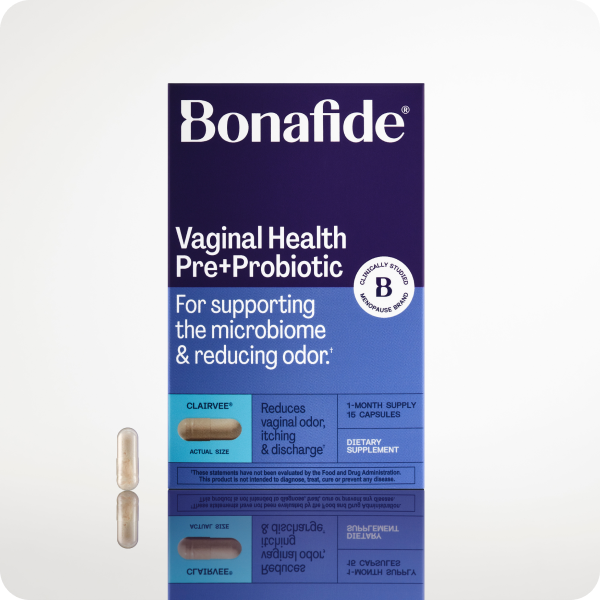You’re likely familiar with the hallmark menopause symptoms of hot flashes and mood swings, but did you know there are currently 34 signs and symptoms of menopause? Ranging from commonplace to curious, these 34 symptoms of menopause are all considered to be connected to this transitional period.
This life stage change can be broken up into three phases: perimenopause, menopause and postmenopause. Menopause itself only lasts a single day — the one that marks an entire year without a menstrual period. The time leading up to menopause, however, when a woman has symptoms related to changing hormone levels, is called perimenopause. Once a woman has “gone through” menopause, she is considered to be postmenopausal.
The 34 Symptoms of Menopause
As a woman enters perimenopause and hormone levels, mainly estrogen and progesterone, begin to fluctuate, she may start to notice individual perimenopause symptoms or a combination of the following 34 symptoms of menopause:
Hot Flashes
Hot flashes are perhaps the most well-known and most talked about symptom , possibly because they’re so common – they’re also known as a vasomotor symptom of menopause. About 80% of women will experience these sudden and intense increases in body temperature caused by hormonal fluctuations, which often start during perimenopause and can last, on average, for 7.4 years – in some instances, they may last up to 10 years or more.1,2 Not every woman will experience the symptom of hot flashes during perimenopause or menopause, however it’s likely that many will, in some level of severity, for at least some period of time.
Night Sweats
Night sweats are simply hot flashes that occur at night. Like hot flashes, night sweats typically start affecting women during perimenopause, so it’s unfortunately not uncommon for a 40-something woman to wake up from sleep soaked in sweat.3 Night sweats can be one of the more disruptive menopause symptoms, as they can wake a person up in the middle of the night and cause sleep problems.
Irregular Periods
Also common during perimenopause, irregular and missed periods may be one of the first early menopause symptoms — although women on hormonal birth control that works to regulate their periods, in addition to hormonal IUDs, won’t necessarily experience this symptom. Over time, periods will become less frequent until they stop completely.4
Weight Changes
Declining estrogen levels and a loss of muscle mass experienced during the menopausal transition can affect the way weight is distributed throughout the body, sometimes resulting in “meno-belly,” in addition to other weight-related body changes.5 And several of the other 34 menopause symptoms, such as fatigue and mood changes, can impact how a woman eats, potentially also influencing weight gain during this time.6
Breast Tenderness
Caused by erratic hormone levels, sore and tender breasts are often one of the first indicators of perimenopause. The good news? This symptom is among the first to resolve as women get closer to menopause and hormones become less volatile.7 Women may experience other breast changes during perimenopause and menopause as well, however, breast tenderness in menopausal women is considered to be one of the more common symptoms.
Mood Changes
Starting during perimenopause, a woman’s mood may fluctuate with her hormone levels. Also considered to be one of the more common 34 symptoms of menopause– around one in five women may deal with mood swings during perimenopause through postmenopause.8 Mood changes during perimenopause and menopause can include shifts like mood swings, as well as increased feelings of anger, sadness, or stress.
Irritability
Increased irritability during menopause can have many causes. It may be related to hormone fluctuations, the compounding effects of some of the other 34 symptoms of menopause, such as poor sleep, lifestyle factors such as stress — or all of the above.9
Depression
The erratic hormone changes that start during perimenopause may make some women more prone to depressed moods during menopause, especially if they have dealt with depression in the past.10 It’s important to note that even women without a history of depression may also experience depressive symptoms during this time due to hormonal shifts, as well as because of outside stressors and life changes (think divorce, loss of a parent, children leaving home, sick relatives, etc.).
Anxiety
Fluctuating hormones, along with sleep disturbances and other lifestyle changes can all contribute to an increased risk of anxiety starting during perimenopause.11 Anxiety can present in different ways, but is commonly associated with feelings of nervousness or impending danger, increased heart rate (including palpations), sweating, trouble sleeping, digestive problems, and/or a feeling of general unrest.
Panic Disorder
In some women, hormonal ups and downs during the menopausal transition can trigger sudden and unexplained panic attacks that can develop into panic disorder if they occur frequently and cause you to worry constantly about when the next one will happen.12 For women struggling with increased panic attacks or disruptive anxiety and depressed moods, speaking with a licensed professional may provide much needed support, as might medication, on an as needed basis.
Sleep Issues
Other menopause symptoms such as night sweats and changes in mood can make getting a good night’s rest challenging during the menopausal transition.13 Up to 47% of perimenopausal women and 60% of postmenopausal women report experiencing sleep disturbances.14 This can include things like interrupted sleep, poor quality of sleep or just having trouble falling asleep and/or staying asleep.
Fatigue
Whether it’s related to changing hormone levels, because of other common symptoms, such as poor sleep, or because of increased multitasking or taking on additional responsibilities, fatigue is commonly experienced by menopausal women. One study of 300 women found that just over 85% dealt with fatigue during menopause.15
Lessened Libido
While hormone changes can affect libido during menopause, this symptom is often secondary, in that it’s influenced by some of the other 34 symptoms of menopause or life changes, such as shifts in body image, emotional ups and downs, relationship shifts or changes in family dynamics, as well as uncomfortable physical symptoms such as vaginal dryness.16 Some women may also note a decrease in sexual desire, sexual satisfaction and orgasm as well.
Headaches
Migraines and other headaches that are triggered by hormone fluctuations may become more notable beginning in perimenopause, when hormone levels are especially volatile and unpredictable. Fortunately, some women may find that their hormone headaches become less frequent after menopause, once hormone levels have evened out.17
Vaginal Dryness
Estrogen promotes blood flow and natural lubrication and helps to keep vaginal tissue lubricated and elastic; decreasing levels of this hormone throughout menopause can cause the onset of vaginal dryness and associated symptoms of burning, irritation, and sometimes, painful sex. This symptom tends to affect women later in the menopausal transition, and often continues to be an issue after menopause.18 It’s also possible for vaginal dryness to occur in women who are postpartum, due to lower estrogen levels, as well as, in women receiving certain cancer treatments.
Thinning Hair
Hormone changes related to menopause can cause hair follicles to shrink, which may in-turn lead to thinning or lost hair.19 More than half of women over 50 deal with hair loss, according to recent research,20 which is why it’s commonly classified as one of the 34 symptoms of menopause.
Brittle Nails
Lack of hydration caused by dropping estrogen levels during menopause can affect the health of your hair, skin and nails.21 When nail layers weaken due to inadequate amounts of keratin in the body, the protein that makes up hair, skin and nails, they may become brittle.22
Bloating
Hormone fluctuations starting during perimenopause can cause water retention that can, in turn, cause a woman to feel bloated.23 Lifestyle factors such as diet and stress levels during menopause can also cause bloating related to excess gas.24
Digestive Issues
Hormones such as estrogen affect your microbiome, the community of microorganisms living in your gut. When hormone levels start to fluctuate during perimenopause, the makeup of your microbiome may change, which can affect digestion.25
Brain Fog
Having trouble concentrating? Changing hormone levels could be to blame. The decline in estrogen that begins during perimenopause can lead to feelings of mental fogginess — as can poor sleep caused by night sweats or another one of the 34 symptoms of menopause, such as stress and anxiety.26
Memory Problems
Like brain fog, memory problems during the menopausal transition are often linked to changing hormone levels. About 62% of women in perimenopause and menopause report declines in cognitive performance, including memory.27 Estrogen is what is known as a “neuroprotective hormone” – meaning it helps to protect your brain, nerves and their functions.28 This may explain why some of the 34 symptoms of menopause are associated with memory and cognition, as they correlate to estrogen decline.
Joint Pain
Estrogen plays a role in keeping your joints lubricated and preventing inflammation,29 so declining estrogen levels during menopause may contribute to an increase in joint pain and swelling. According to data from a study by the Women’s Health Initiative, 44% of participants reported a diagnosis of osteoarthritis after menopause,30 which is why it’s considered to be one of the 34 symptoms of menopause that carry into postmenopause.
Muscle Aches
Loss of inflammation-easing estrogen can also contribute to sore muscles. One study found that 71% of perimenopausal women experienced musculoskeletal pain.31
Osteoporosis
As you progress through the menopausal transition, loss of bone-protecting estrogen may increase your risk of osteoporosis, a condition characterized by weak and brittle bones.32 This condition is serious because women are more likely to experience unexpected bone fractures and breaks due to an overall weakening of their bones.
Itchy Skin
Estrogen is involved in the production of collagen, which helps keep skin moist and supple. When estrogen levels decline during menopause, so does collagen — which may result in reduced elasticity (resulting in more notable sagging skin), in addition to dry, itchy skin.33
Dizziness
Fluctuating hormone levels that begin in perimenopause can affect the inner ear and blood sugar levels in ways that may lead to dizziness. Indirectly, fatigue related to menopause can also cause a woman to feel dizzy.34 Additionally, if night sweats are leaving you feeling thirsty when you wake up and hot flashes have you perspiring all throughout the day, you might also feel dizzy due to dehydration.
Heart Palpitations
If you feel like your heart is beating faster than usual during menopause, this can actually be due to hormone fluctuations.35 Though this symptom is usually harmless, you should let your healthcare provider know if you notice any worrisome changes to your heartbeat.
Burning Tongue and/or Mouth
Did you know the mucus hormones in your mouth have sex hormone receptors? Because of these receptors, changing hormone levels during menopause can cause sensations of burning, numbness and tingling in the tongue or mouth.36 Additionally, research estimates that up to 60% of menopausal women may experience some form of oral discomfort. Often this takes the form of dry mouth or gum sensitivity – however, shifting teeth, can also occur,37 classifying this group of symptoms as part of the recognized 34 symptoms of menopause.
Changed Sense of Taste
The same sex hormone receptors in the mouth that can cause mouth and/or tongue burning may also affect a woman’s sense of taste — and, as mentioned, oral health in general during the menopausal transition.38
Tingling Limbs
You probably don’t associate a tingling sensation in your extremities with menopause, but hormone changes can affect the central nervous system in such a way that some women periodically experience tingling in the hands, feet, arms or legs for a few minutes at a time during the menopausal transition.39
Shock-like Sensations
Starting during perimenopause, some women may experience sensations similar to an electric shock beneath the skin – this is actually tied into one of the 34 symptoms of menopause. These shocks likely occur because the electric impulses used as a signaling mechanism in the body to the brain are disrupted by hormone fluctuations during menopause.40 As mentioned earlier, estrogen is a neuroprotective hormone, whose decline may instigate shock-like sensations and related symptoms.
Allergies
As unlikely as it may seem, you may experience new or worsening allergy symptoms during menopause. This is because fluctuating hormone levels can cause spikes in histamine, the chemical that triggers allergic reactions as part of your body’s immune response.41
Urinary Changes
Several urinary changes can accompany menopause. One, commonly known as overactive bladder (OAB), is characterized by a frequent or sudden urge to urinate. Another, known as urinary incontinence, is characterized by an involuntary loss of urine and can accompany overactive bladder. It sometimes affects women during the menopausal transition because changing hormone levels can lead to weakened muscles in the pelvic floor that help control the bladder.42 Childbirth, weight and genetics can also contribute to this symptom.
Body Odor
Several of the 34 symptoms of menopause like hot flashes and night sweats can cause women to perspire more, which can in-turn lead to changes in body odor.43 An increase in testosterone relative to the amount of estrogen in the body can also bump up the amount of odor-causing bacteria present in sweat during menopause.44
Similarly, it’s not uncommon to experience the onset of vaginal odor during menopause. This has to do with shifts experienced in the vaginal microbiome, which are commonly affected by fluctuations of hormone levels.45
Seeking Support for Menopause Symptoms
Although it’s not at all unusual to experience any (or all) of the 34 symptoms of menopause during this transitional time, don’t hesitate to reach out to your healthcare provider or a menopause specialist with questions or concerns. Based on your symptoms, you can choose to explore natural remedies or prescription options to support your body during this transitional time.
Resources
- https://www.swanstudy.org/up-to-14-years-of-hot-flashes-found-in-menopause-study/
- https://www.mayoclinic.org/diseases-conditions/hot-flashes/symptoms-causes/syc-20352790
- https://www.hopkinsmedicine.org/health/wellness-and-prevention/did-i-just-have-a-hot-flash-im-44?amp=true
- https://www.medicalnewstoday.com/articles/322480#managing-periods
- https://www.princetongyn.com/blog/menopausal-weight-stop-the-middle-age-spread
- https://www.ncbi.nlm.nih.gov/pmc/articles/PMC6947726/
- https://www.healthywomen.org/ask-expert/perimenopausal-breast-tenderness
- https://www.menopause.org/for-women/sexual-health-menopause-online/causes-of-sexual-problems/depression-mood-swings-anxiety
- https://www.webmd.com/menopause/guide/emotional-roller-coaster
- https://www.hopkinsmedicine.org/health/wellness-and-prevention/can-menopause-cause-depression
- https://www.medicalnewstoday.com/articles/317552#treatment
- https://health.clevelandclinic.org/is-menopause-causing-your-mood-swings-depression-or-anxiety/amp/
- https://www.nia.nih.gov/health/sleep-problems-and-menopause-what-can-i-do
- https://www.ncbi.nlm.nih.gov/pmc/articles/PMC3185248/#S1title
- https://www.ncbi.nlm.nih.gov/pmc/articles/PMC5866170/#S5title
- https://www.medicalnewstoday.com/articles/320266#menopause-and-libido-
- https://www.mayoclinic.org/diseases-conditions/chronic-daily-headaches/in-depth/headaches/art-20046729
- https://www.webmd.com/menopause/menopause-vaginal-dryness
- https://www.ncbi.nlm.nih.gov/pmc/articles/PMC4828511/
- https://www.nbcnews.com/news/amp/rcna16389
- https://www.ncbi.nlm.nih.gov/pmc/articles/PMC3984489/
- https://menopause.livebetterwith.com/blogs/stories-info/brittle-nails-in-menopause-what-can-help
- https://www.healthline.com/health/menopause/menopause-bloating
- https://www.medicalnewstoday.com/articles/319609#water-retention-vs-gas-retention
- https://www.ncbi.nlm.nih.gov/pmc/articles/PMC5625026/
- https://www.health.harvard.edu/blog/sleep-stress-or-hormones-brain-fog-during-perimenopause-202104092429
- https://www.ncbi.nlm.nih.gov/pmc/articles/PMC4125424/
- https://pubmed.ncbi.nlm.nih.gov/12042878/
- https://www.ncbi.nlm.nih.gov/pmc/articles/PMC2787275/
- https://www.ncbi.nlm.nih.gov/pmc/articles/PMC5385852/#S4title
- https://www.ncbi.nlm.nih.gov/pmc/articles/PMC7710408/
- https://www.ncbi.nlm.nih.gov/pmc/articles/PMC5643776/
- https://www.medicalnewstoday.com/articles/322587#home-remedies
- https://www.medicalnewstoday.com/articles/319860#causes
- https://www.bhf.org.uk/informationsupport/heart-matters-magazine/medical/women/menopause-and-your-heart
- https://www.medicalnewstoday.com/articles/323424#home-remedies
- https://www.ncbi.nlm.nih.gov/pmc/articles/PMC4195183/
- https://www.ncbi.nlm.nih.gov/pmc/articles/PMC3793432/
- https://www.menopausecentre.com.au/tingling-extremities/
- https://www.menopausenow.com/electric-shocks
- https://www.ncbi.nlm.nih.gov/pmc/articles/PMC3658477/
- https://www.ncbi.nlm.nih.gov/pmc/articles/PMC6528037/
- https://my.clevelandclinic.org/health/symptoms/17865-body-odor
- https://www.mymenopausecentre.com/symptoms/body-odour/
- https://journals.asm.org/doi/10.1128/msphere.00593-20














Comments
Post commentIt is amazing the amount of changes the body goes through during menopause. I have experienced many of these symptoms like dryness, depression, sleeplessness and so on. I’m appreciative of this article to list all 34 as sometimes you feel lost trying to figure it all out. Thank you for your clear explanations and advice as well as providing information on supplement relief.
Some of these symptoms I have never heard before being associated with menopause. The digestive issues took me by surprise! I am managing with herbal tea and probiotics. Thank you for this article.
I appreciate very much the information. Being post-menopausal, intercourse was very painful for me. So hubby didn’t want me to be in pain, and we stopped having sex. It’s been over a year now and I’ve been using Bonafide products for several weeks and ready for sex again! Thank you for educating me!
Omg, thank you so much, I’ve had all those symptoms except the smelly vaginas but the scariest one was the shock, I didn’t know what was happening to me. It’s bad. Should I be on family medical leave when I experience these catastrophes.
Let your audience know that there are different size speculums & to ask their Dr. about that !!!!